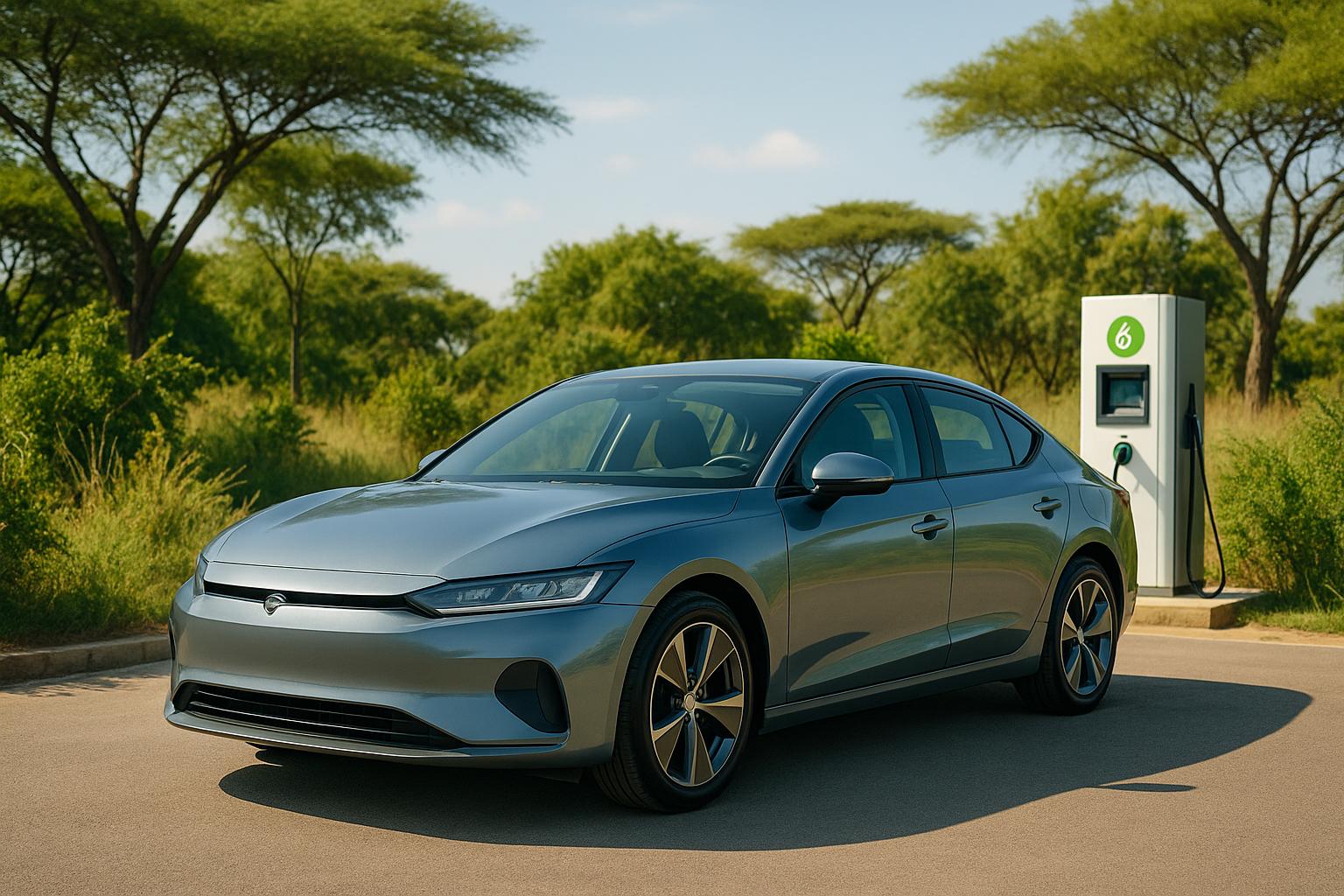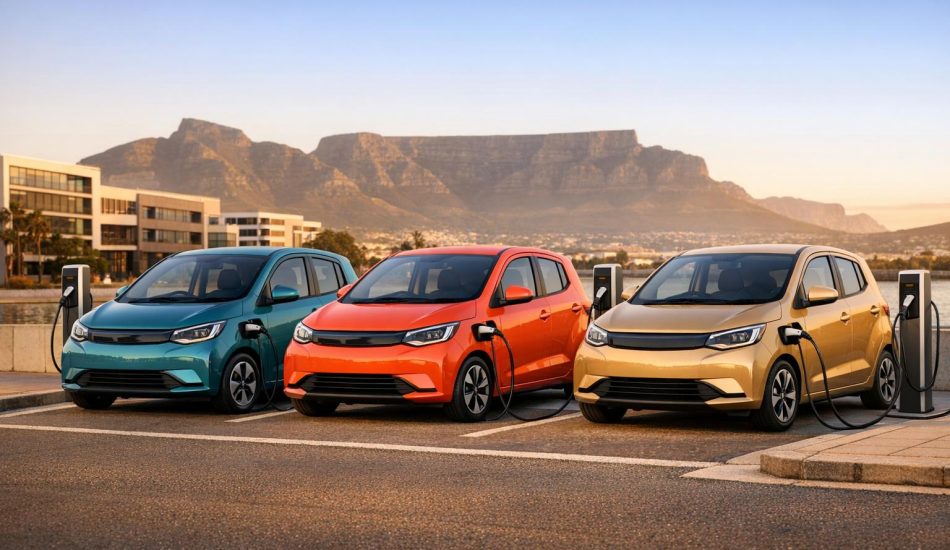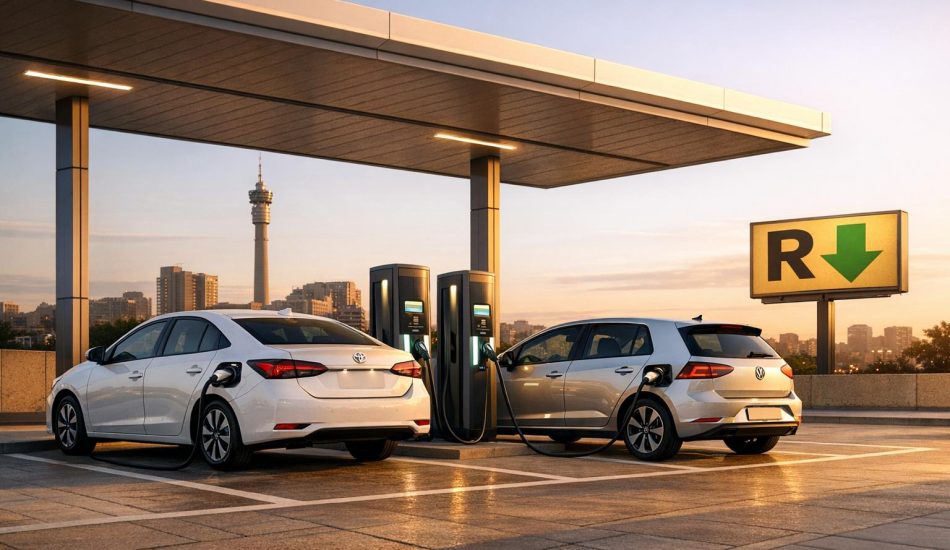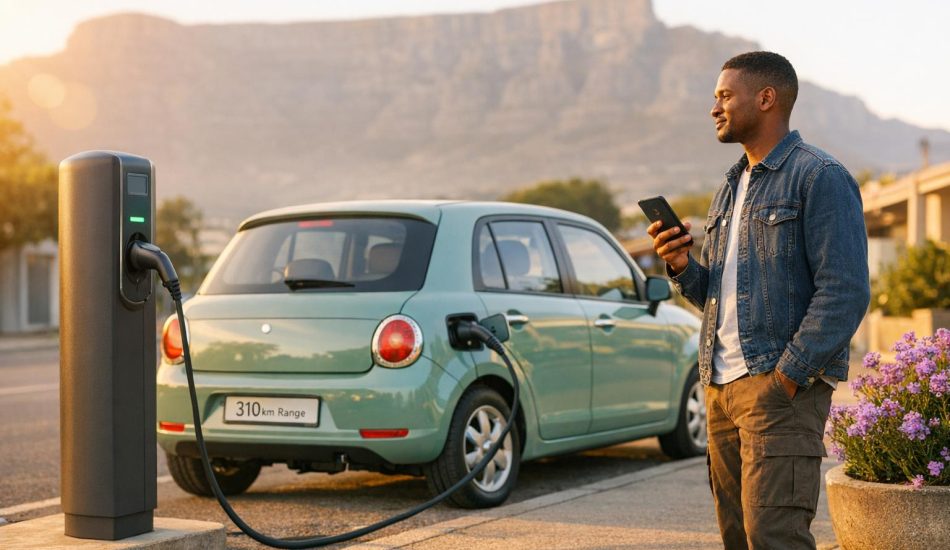
Electric cars are gaining traction in Tanzania in 2025, offering lower fuel costs, reduced maintenance, and a cleaner alternative to traditional vehicles. With over 5,000 EVs already on the roads and platforms like EV24.africa simplifying the buying process, it’s easier than ever to make the switch. Here’s what you need to know:
- Popular Models: Tesla Model 3, BYD Dolphin, Volkswagen ID.4, and Nissan Leaf are among the top choices, with prices starting at $7,100 for used models.
- Cost Savings: EVs can cut fuel costs by up to 86% and require 50% less maintenance compared to gas-powered vehicles.
- Charging Infrastructure: Though still developing, charging stations are expanding, particularly in Dar es Salaam, with home charging setups costing around $1,300.
- Buying Process: Platforms like EV24.africa handle import logistics, customs, and delivery, making it straightforward to own an EV.
Switching to an electric vehicle in Tanzania is becoming more practical and affordable, driven by a growing market and government support.
ELECTRIC VEHICLES MADE IN TANZANIA (@kaypeemotorsltd) is a Tanzanian
(@kaypeemotorsltd) is a Tanzanian
Best Electric Car Models Available in 2025
Tanzania’s electric vehicle (EV) market is on the rise, and 2025 is shaping up to be a pivotal year. With projections showing growth from $0.04 billion in 2025 to $0.22 billion by 2030, at an impressive 40.5% compound annual growth rate (CAGR), the country is embracing the shift to greener transportation. The government aims for EVs to make up 5% of new vehicle sales by 2030, and with 5,000 EVs already on the roads, the momentum is undeniable. Platforms like EV24.africa are playing a key role in bringing the newest EV models to Tanzanian buyers.
Popular Brands and Models in Tanzania
EV24.africa offers a diverse selection of EVs sourced from Europe, Asia, North America, and Japan, ensuring vehicles are well-suited to local driving conditions. These models bring a mix of global engineering and practicality to Tanzania’s roads.
- Tesla: The Model 3 and Model Y stand out for their advanced technology and extensive charging compatibility, making them a premium choice.
- BYD: Models like the Dolphin and Seal are known for their reliable battery technology and everyday practicality.
- Volkswagen: Renowned for its European engineering, Volkswagen offers sturdy, well-built EVs.
- Chinese Brands: XPeng, Leapmotor, Changan, and Wuling deliver competitive features at attractive price points.
- Mercedes-Benz: For those seeking luxury, Mercedes-Benz combines comfort with cutting-edge EV technology.
- Citroën and Peugeot: These French brands are ideal for both city driving and longer trips with versatile designs.
EV24.africa’s inventory caters to a range of needs, offering both passenger vehicles and light commercial options.
Features Built for Tanzanian Roads
The EVs available through EV24.africa are designed with Tanzania’s unique road conditions in mind. All vehicles feature right-hand drive configurations for local safety standards. They are built to handle the challenges of Tanzanian terrain, from urban streets to rugged rural routes.
These vehicles come equipped with efficient range capabilities, making intercity travel feasible even with the country’s limited charging infrastructure – currently around 15 stations, primarily concentrated in Dar es Salaam. Their durable construction and high ground clearance ensure they can navigate both highways and rougher roads with ease. Additionally, the inclusion of versatile charging options, such as fast DC and standard AC, ensures compatibility with Tanzania’s evolving EV infrastructure.
Electric Car Prices and Costs
Getting a clear picture of the financial aspects is essential when considering an electric car in Tanzania. While the initial cost of electric vehicles (EVs) is higher than that of traditional cars, the growing market is steadily making them more accessible. Let’s take a closer look at pricing across different EV categories and other costs that come into play.
Price Ranges for New and Used EVs
For budget-conscious buyers, the used EV market offers affordable options. For instance:
- Nissan Leaf (2018–2021 models): $7,100 to $9,400
- Nissan Sakura: $8,150 to $10,300
Moving up to mid-range EVs, you’ll find a balance between price and features:
- Tesla Model 3 (2020–2022 models): $14,700 to $21,150
- Toyota Prius PHV: $15,150
- Mitsubishi Eclipse Cross PHEV: $16,450
- Volkswagen ID.4: $18,650
For those seeking luxury, premium EVs include:
- BMW i4: Starting at $25,750
- BMW iX3: $26,250
- Mercedes Benz EQS: $40,800
It’s important to note that these prices are FOB (Free on Board). For a complete picture of the total landed cost, including shipping and insurance, platforms like EV24.africa can provide CNF (Cost and Freight) details upon request.
Extra Costs to Consider
The base price of an EV is just one part of the equation. Several additional costs can impact your total investment:
- Import Duties and Taxes: Current import policies significantly raise the upfront cost of EVs. A study from ScienceDirect suggests that reducing import taxes by 40% or more – effectively eliminating import duties or value-added taxes – could help EVs achieve total cost of ownership (TCO) parity with internal combustion engine (ICE) vehicles.
- Charging Infrastructure: Setting up a home charging station can be a sizable expense. A Level 2 charger typically costs $500 or more, and installing a 240-volt outlet could add several hundred dollars. According to the U.S. Department of Energy, a complete home charging setup averages around $1,300.
- Registration and Insurance: Fees for documentation, registration, and insurance vary by region. Be sure to consult local authorities for accurate estimates.
- Maintenance: EVs generally cost less to maintain due to fewer moving parts. However, specialized services might occasionally be required. Additionally, with limited charging infrastructure in some areas, buyers may need to invest in portable charging solutions or carefully plan for long trips.
Price Comparison Table
| Model | Price Range (USD) | Type | Features |
|---|---|---|---|
| Nissan Leaf (2018–2021) | $7,100 – $9,400 | Compact EV | Reliable, ideal for city driving |
| Tesla Model 3 (2020–2022) | $14,700 – $21,150 | Sedan EV | Advanced tech, wide charging network |
| Toyota Prius PHV | $15,150 | Plug-in Hybrid | Gas backup, excellent efficiency |
| BMW i4 | $25,750 | Luxury Sedan | High-end features, sporty performance |
| Mercedes Benz EQS | $40,800 | Luxury EV | Top-tier luxury and advanced tech |
While EVs require thoughtful financial planning, their lower running costs and the ongoing development of charging infrastructure make them an increasingly appealing option for long-term savings and sustainability.
sbb-itb-99e19e3
How to Buy an Electric Car in Tanzania
Purchasing an electric vehicle (EV) in Tanzania doesn’t have to be a complicated process. With platforms like EV24.africa, you can handle everything from research to delivery with ease. Here’s a guide to help you navigate the process.
Step-by-Step Buying Process
Start by exploring the available EV options on EV24.africa. You can filter your search based on your budget, preferred brand, and desired features. Each listing provides detailed information, including the vehicle’s condition, mileage, manufacturing year, and a full cost breakdown (covering the base price, duties, and delivery fees).
Once you’ve found an EV that suits your needs, EV24.africa takes care of the logistics. This includes managing the import process, handling customs clearance, calculating taxes and duties, and scheduling delivery.
Tips for First-Time Buyers
When purchasing your first EV, it’s essential to consider the total cost of ownership. This includes not just the purchase price but also duties, registration fees, insurance, and ongoing maintenance expenses. If you’re deciding between new and used EVs, weigh the pros and cons carefully. Used EVs often come with lower upfront costs and slower depreciation, while new EVs provide warranty coverage and the latest technology.
In East Africa, including Tanzania, most EVs are two- or three-wheelers, with fewer than 5,000 four-wheel EVs across Kenya, Uganda, and Tanzania combined. Make sure the vehicle you choose aligns with your driving needs – whether it’s for city commutes or rural travel.
For imported vehicles, always review the mechanical history and request detailed photos and documentation. A proper inspection is crucial. Additionally, ensure you have all the necessary paperwork in order.
Home charging is another key consideration. Obtain a quote for installing an EV charger at home, as electrical upgrades might be required. A home charger can help you avoid relying too heavily on public charging, which is still developing in Tanzania. Apps like PlugShare can help you locate nearby public chargers. Before finalizing your purchase, test-drive the vehicle and be cautious of deals that seem too good to be true. Keep in mind that extreme temperatures and high speeds can impact an EV’s range.
Payment and Documentation
Once you’ve selected your EV, you’ll need to finalize the purchase. EV24.africa provides flexible payment options, including Mobile Money (e.g., M-Pesa), Bank Transfer, and Cryptocurrency. Transactions are conducted in U.S. dollars to accommodate the international nature of vehicle imports.
The importation process requires specific documents, such as commercial invoices, packing lists, bills of lading, and certificates of origin. EV24.africa can assist with preparing these documents and ensuring a smooth title transfer.
Don’t forget to arrange for insurance before your EV arrives. Additionally, keep an eye on Tanzania’s evolving regulations for electric vehicles, as the government is working on a national policy framework to standardize importation, registration, and usage. Staying informed about these developments will help you navigate future transactions more smoothly.
Delivery and Owning an Electric Car in Tanzania
Delivery Options and Timelines
When you purchase an EV through EV24.africa, they handle the entire delivery process, ensuring your car arrives right at your doorstep. Typically, vehicles are shipped by sea to the Dar es Salaam Port, with delivery taking anywhere from 4 to 8 weeks, depending on the shipping method you choose.
| Shipping Method | Best For | Cost | Delivery Time | Vehicle Condition |
|---|---|---|---|---|
| RoRo | Single, operational vehicles | Lower | Faster | Must be drivable |
| Container | Multiple or delicate EVs | Higher | Slightly slower | Can be non-operational |
EV24.africa also takes care of customs processes, including calculating duties and taxes. Expect around 25% import duties and 18% VAT based on the CIF value. Once the vehicle clears customs, you’ll need a licensed clearing agent to assist with registration through the Tanzania Revenue Authority (TRA). After that, your focus will shift to setting up convenient charging options for your EV.
Charging Infrastructure and Costs
Tanzania’s EV charging infrastructure is still in its early stages, but progress is happening fast. With around 5,000 electric vehicles already on the roads, the government is actively working to expand charging networks.
Dar es Salaam is leading the way in this development. In September 2024, the Dar Rapid Transit Agency (DART) partnered with TRÍ to set up charging stations at key locations such as Ubungo Depot, Gerezani Main Station, and Morocco Station, with another planned for the Magufuli Bus Terminal.
"This project is crucial for addressing last mile connectivity, allowing customers to easily access our DART infrastructure with clean energy transport options. This initiative is also a key step in our battle against environmental pollution", – Ms. Delfina Mathias, Project Coordinator for Solution Plus and DART’s Manager of Transport Systems and Infrastructure Development.
The installation began on September 1, 2024, and is expected to wrap up in three months. These stations primarily serve electric two-wheelers and three-wheelers, but they mark a significant step toward broader EV support.
"We aim to install charging stations that are easily accessible for users of electric gutas, motorbikes, and bajajis, enabling them to charge their vehicles and continue their cargo and passenger transport businesses efficiently", – Ms. Mercy Kitomari, Policy and Advocacy Lead at TRÍ.
For home charging, it’s a good idea to get quotes for installation and any necessary electrical upgrades before your EV arrives. Meanwhile, the government is working on tax incentives to encourage EV adoption and expand the charging network.
"We are working towards including incentives in the tax laws to create a supportive environment for EV registration and charging infrastructure", – Dr. Gerald Kafuku, Innovation and Technology Manager at the Commission for Science and Technology (Costech).
Once your EV is delivered and charging is sorted, the focus shifts to long-term maintenance and support to ensure a smooth ownership experience.
Maintenance and Support for EV Owners
Owning an electric vehicle in Tanzania comes with its perks, especially when it comes to maintenance. EVs generally require less upkeep than traditional cars, which means fewer costs over time.
Several local providers are stepping up to meet the growing demand for EV services. TRÍ in Dar es Salaam is a leader in EV maintenance, having sold 200 E2 electric three-wheelers and built expertise in assembly and repairs. They can assemble a three-wheeler in about 2.5 hours, while repairs range from one hour to two days depending on the issue.
SGS Tanzania offers a range of e-mobility services, including battery testing, reliability assessments, and functional safety checks for EVs. WAGAMotion provides end-to-end support, from maintenance and repairs to charging infrastructure and software solutions. Meanwhile, Karimjee Group’s Auto Inc. service station has adapted to handle EV-specific needs, making it a reliable choice for traditional and electric vehicle repairs.
Through EV24.africa, owners can connect with trusted local service providers for routine maintenance and repairs. Most EV upkeep involves tasks like tire rotations, brake inspections, and software updates – far simpler than the oil changes and engine repairs required for gas-powered cars. This simplicity translates to fewer service visits and lower long-term costs, making EV ownership an increasingly appealing option for drivers in Tanzania.
Conclusion
Purchasing an electric car in Tanzania in 2025 presents an exciting opportunity for drivers. As one of the top five African countries adopting electric vehicles, with over 5,000 EVs already on the roads, you’ll be part of a growing shift toward cleaner, more sustainable transportation.
The benefits go beyond reducing emissions. Electric vehicles offer real financial perks, like cutting down on fuel costs, making them a smart choice for your wallet, too. Plus, they provide quieter rides that not only enhance eco-tourism but also help reduce urban noise and air pollution in bustling cities like Dar es Salaam, Arusha, Dodoma, and Mwanza.
EV24.africa takes the hassle out of buying an electric car. Forget dealing with complicated import processes, unpredictable pricing, or limited options. This platform handles everything – from customs clearance to transparent pricing – and delivers your chosen EV straight to your doorstep. With a lineup of over 200 models and flexible financing options, finding the right electric car for your lifestyle and budget has never been easier. EV24.africa makes owning an EV straightforward and stress-free.
Once your vehicle arrives, Tanzania’s growing network of charging stations and maintenance services ensures you’re well-supported for the long haul.
"EV adoption is accelerating – but politics, not technology, will decide who leads and who lags", says Christian Brand, emeritus professor in transport, energy, and climate change at Oxford University.
With strong government support, including favorable policies and reduced import duties, making the switch to electric is simpler than ever. Thanks to platforms like EV24.africa, Tanzanian drivers can embrace cleaner, more accessible transportation in 2025 with confidence and ease.
FAQs
What should I consider when deciding between a new or used electric vehicle in Tanzania?
When you’re choosing between a new or used electric vehicle (EV) in Tanzania, there are a few important things to consider:
- Age and Import Rules: Tanzania has an 8-year age limit on imported vehicles. This means your options for used EVs could be limited. Always check that the vehicle meets these requirements.
- Cost and Value: While used EVs typically cost less upfront, they might have higher maintenance needs and shorter or no warranties. New EVs, on the other hand, come with the latest features, full warranty coverage, and potentially lower maintenance costs, but they require a bigger initial investment.
- Charging and Incentives: Look into the availability of charging stations in your area. Also, check if there are any government incentives or tax benefits for buying a new EV. These can make a big difference in your overall expenses and convenience.
By carefully considering these factors, you can choose the EV that best fits your budget and lifestyle in Tanzania’s expanding EV market.
How does Tanzania’s charging infrastructure affect the usability of electric vehicles?
The charging infrastructure in Tanzania is still in its early stages, with about 15 public charging stations primarily found in urban areas. This limited network poses challenges for electric vehicle (EV) owners, especially for those in rural regions or anyone considering long-distance travel. A common concern among potential EV buyers is range anxiety – the worry of running out of battery power without a nearby charging option.
That said, there’s hope on the horizon. Investments in EV infrastructure are underway, and more charging stations are expected to roll out in the coming years. For now, owning an EV in Tanzania is most practical for city dwellers or those who can rely on home charging setups.
What are the cost savings and financial advantages of owning an electric car in Tanzania?
Switching to an electric vehicle (EV) in Tanzania can be a smart move for your wallet. EVs can slash fuel expenses by up to 86% compared to traditional gas-powered cars, as electricity is much cheaper than fuel. On top of that, EVs generally need less maintenance, which could cut repair and service costs by about 50%.
The Tanzanian government sweetens the deal with tax exemptions on VAT and customs duties, potentially reducing the upfront cost of an EV by as much as 25%. When you combine these savings with lower operating costs, owning an EV becomes an economical and practical option for drivers in the region.




